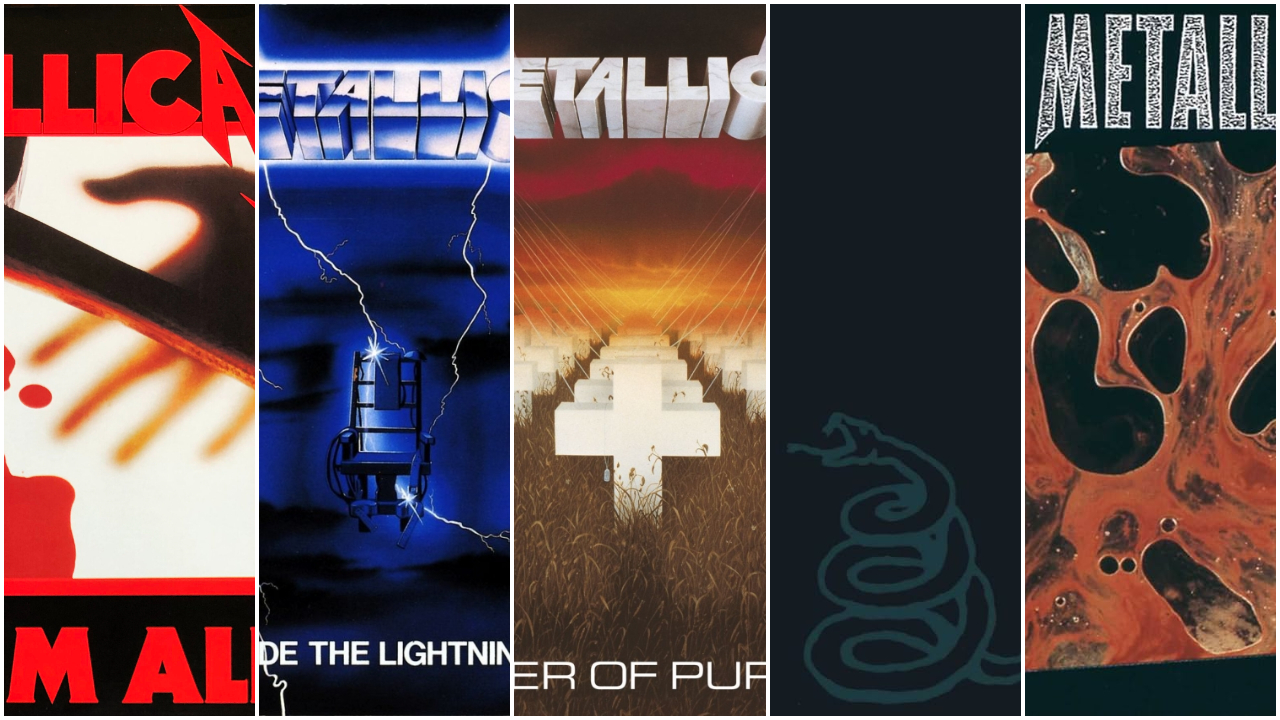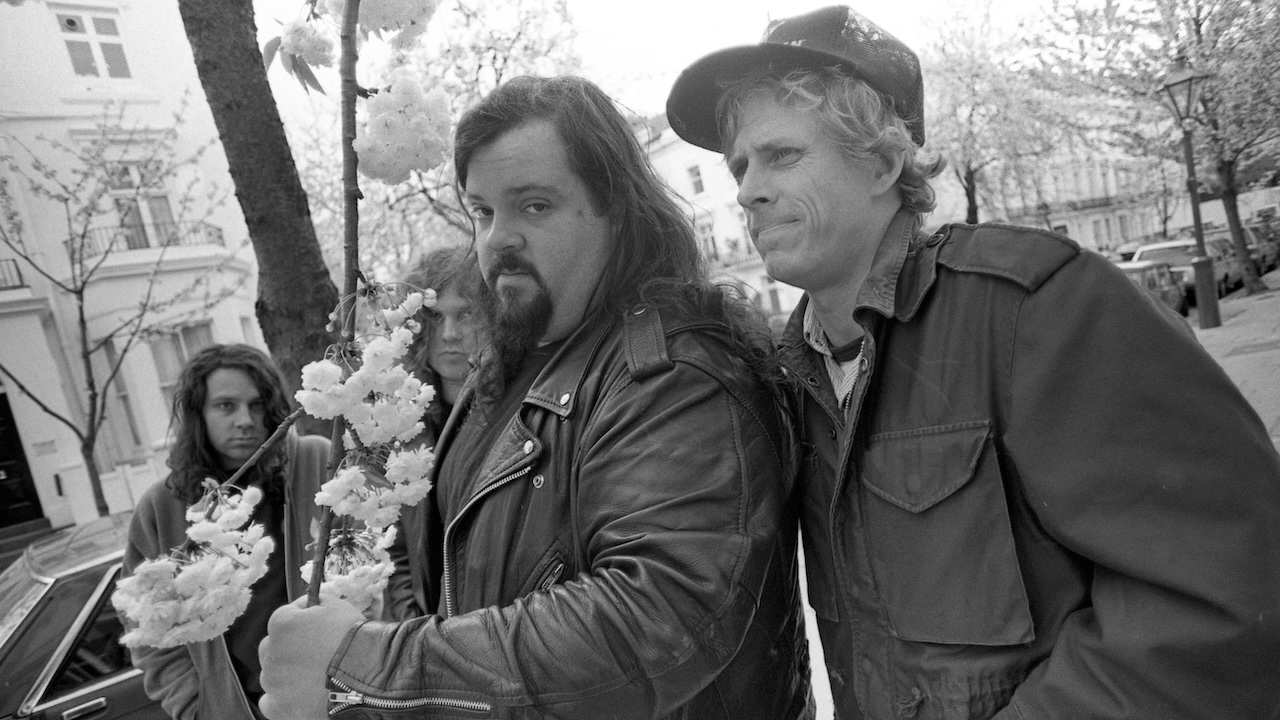"Lambasting it as 'selling out' directly contradicts its musical integrity and emotional vulnerability. It's all killer, no filler." Metal Hammer's writers battle it out over which is Metallica's best album
They are the band that have defined and redefined heavy metal. But which album is their greatest? Our writers get in the ring

In heavy metal, it just doesn't get any bigger. From the moment they practically invented thrash metal with rip-roaring 1983 debut album Kill 'Em All to redefining metal on the big stage with The Black Album, all the way through their divisive 90s sidesteps and return to full metallic fury in the 21st century, no band in heavy music has done things quite like Metallica.
Their storied career and wildly differing styles across the decades have meant that, depending on either your entry point or the sounds that simply resonate with you the most, your choice of favourite Metallica album is almost certainly different from the next fan you happen to bump into. We got six of our writers and biggest Metallica lovers to debate which LP across their illustrious career deserves to sit at the very top of the pile.

Kill 'Em All (1983)
Across Metallica's expansive discography, Kill 'Em All reigns supreme, with a raw, untamed ferocity that later albums have never quite recaptured. It’s not a matter of nostalgia; this is about the seismic shift that it heralded in the landscape of heavy metal. From the tempestuous roar of opener Hit The Lights, Kill 'Em All is a relentless assault, an album that embodies thrash metal's genesis—a gene splice of NWOBHM’s complexity and punk’s visceral impact.
The technical prowess of James Hetfield's rhythm guitar didn’t just set a new standard; it rewrote the rulebook, while on tracks like Whiplash and Seek & Destroy, the band's collective precision made the extraordinary seem effortless. The contributions of ex-member Dave Mustaine (including The Four Horsemen and Jump In The Fire) and the legendary Cliff Burton coloured Kill 'Em All with hues of dark, malevolent energy. Critics often note the album's lack of musical variation, but what it "lacked" in diversity, it made up for in unbridled aggression and commitment to a singular, pulverising vision. Subsequent albums may have showcased Metallica's growth and technical ambition, but none would ever match the purity and intensity of their debut. More than just Metallica's best album, it's a siren call that reverberates through the annals of metal history. Kill 'Em All didn’t just change the game - it became the game.
JOE DALY
Ride The Lightning (1984)
In terms of pushing thrash metal to its limits and crafting something that would truly define the genre forever, Master Of Puppets is absolutely deserving of every single one of the accolades it's earned over the years. But for the best collection of songs on any Metallica album? It's Ride The Lightning all day long. Building upon the raw energy of Kill 'Em All to produce a series of tracks that are equal parts earth-shakingly heavy and stirringly majestic, Ride The Lightning is as perfect an encapsulation of heavy metal as you could possibly hope for.
Bursting out of the gate with the righteous fury of Fight Fire With Fire, the album then charges head-first into the best three-track run of Metallica's entire discography. The title track's stomping, chugging riff is pure mana for headbangers; For Whom The Bell Tolls is a towering, imperial behemoth fit for the end times; Fade To Black remains the most beautifully realised, emotional metal power ballad ever put to tape. Meanwhile, Trapped Under Ice is a glorious reminder of the speed metal venom that was still coursing through the band's veins and instrumental The Call Of Ktulu is a mighty epic to close us out on. Hell, even the album's infamous 'low point' - Escape - is loads of fun and way better than people give it credit for. Oh, and one more thing: CREEPING FUCKING DEATH!!!!!
MERLIN ALDERSLADE
Master Of Puppets (1986)
Long before Stranger Things turned the title track of Metallica’s third album into the metallic equivalent of Journey’s Don’t Stop Believin’ (i.e. culturally ubiquitous for several months), Master Of Puppets had already been widely acknowledged as (at the very least) one of the greatest metal records of all time. After the ferocious opening gambit of Kill ‘Em All and the startling sophistication of Ride The Lightning, Metallica were on a fast-track to massive global success, and Master Of Puppets sealed the deal in the most bombastic, neck-wrecking way possible. Unique in Metallica’s catalogue, it is an album with no discernible flaws, eight stone-cold classic songs and artwork that was immediately iconic.
Sign up below to get the latest from Metal Hammer, plus exclusive special offers, direct to your inbox!
Flemming Rasmussen’s production was utterly crushing: crystal clear and perfectly polished, but with muscle and grit by the truckload. Coupled with songs as immortal and undeniable as Battery, Welcome Home (Sanitarium) and instrumental behemoth Orion, Metallica had made a new benchmark for heavy metal, and one that they have never come close to topping. Still confused about why OG Metallica fans have spent the last 30 years griping about the band’s patchy output? One listen to Master Of Puppets should be sufficient. They have never sounded this tight, this brutal, this vital or this imperious since.
...And Justice For All (1988)
With their first three albums, Metallica not only helped define the nascent thrash metal scene, but established themselves at the top of the totem pole. Justice marked the moment where they set their sights even higher, coming out the other side into some post-thrash landscape where no idea was too ambitious. Granted, there’s a lot to be said about the choice to reduce newcomer Jason Newsted’s bass in the mix – and we’d absolutely suggest sticking on the Justice For Jason fan-edit on YouTube if you haven’t ever heard it – but ultimately it's drops in the ocean. While these days they might sing about full speed or nothin’, Justice… is the clearest example of Metallica asserting their identity over the thrash sound, inspiring other bands to play with multi-tiered songwriting, each song serving like its own mini-metallic symphony.
Blackened, the title-track and Eye Of The Beholder are the logical end-point to the epic craft Metallica had developed on Ride The Lightning, while One gave the band their first bona fide hit that ensured they weren’t just making a big splash in the kiddie pool. While they’d go on to greater commercial heights in the next ten years (and decidedly patchier material going forwards), Justice… tied a ribbon on the decade that had made Metallica metal’s most important band, proof that they were playing an entirely different game to just about everyone else on the planet.
RICH HOBSON
Metallica (1991)
Arguing that the Black Album is Metallica’s magnum opus is almost too easy. The Four Horsemen’s fifth full-length is the biggest metal album of all time, no hyperbole. And, as much as people like to bellyache about “selling out”, or the band’s 80s classics doing the real legwork to build their legacy – nothing gets this monumental without being fucking good. The Black Album pulled Metallica away from the contorting thrash of Puppets and Justice, absolutely. However, that description overlooks the earnestness, ambition and ingenious songwriting blaring from every second. Enter Sandman and Sad But True are all-time earworms, but also refused to compromise on the band’s muscle and attitude. Meanwhile, The Unforgiven’s weaving from metal to Wild West acoustics has never been outdone (not even by Metallica with their two sequels). Nothing Else Matters similarly reignited the power ballad, only for none of the wannabes to touch its grace and influence.
The fire-spewing Papa Het also demonstrates brave personal growth. The frontman breaks from “badass” cliche to not only celebrate his then-girlfriend on Nothing…, but, with The God That Failed, lament the Christian Science beliefs that killed his mum. Lambasting the Black Album as “selling out” directly contradicts its musical integrity and emotional vulnerability. It's all killer, no filler.
MATT MILLS
Load (1996)
Metallica’s 80s period was spectacular, no doubt about it; no one could ever deny those landmark records. But, if you don’t just exhaustingly use “metal” as a shorthand for “good music”, if you like bold reinvention, genuine risks, the fearlessness not to care about alienating your huge fanbase and hearing a band make the record that they feel most represents their true selves, Load ticks all of those boxes with stunning regularity. Clearly emboldened and inspired by U2’s chameleonic, career-best Achtung Baby five years prior, Metallica took the grandest leap of their career, and decades down the line, with all the controversy and teeth-gnashing having worn down, it undeniably paid off; the dark, brooding moods of Until It Sleeps and Bleeding Me; the strutting rock and roll of Ain’t My Bitch and The House that Jack Build; the subtle, heartfelt lament of Mama Said. They might not be "metal", but they’re fantastic, unique, surprising and unusual songs in the ‘Tallica cannon.
But the two most compelling arguments for Load are the slow-building, 10-minute brilliance of closer The Outlaw Torn, which deserves to be lauded as one of their finest ever songs, and, controversially, the band's look at the time. The short hair, eyeliner and vests made OG fans furious back in 1996, but today, the catwalk, Depeche Mode-meets-Sopranos-cast-member vibes that legendary photographer Anton Corbijn captured in this era is without a doubt the coolest Metallica ever looked. And you know what? They sounded just as good, too.
STEPHEN HILL

Merlin was promoted to Executive Editor of Louder in early 2022, following over ten years working at Metal Hammer. While there, he served as Online Editor and Deputy Editor, before being promoted to Editor in 2016. Before joining Metal Hammer, Merlin worked as Associate Editor at Terrorizer Magazine and has written for Classic Rock, Rock Sound, eFestivals and others. Across his career he has interviewed legends including Ozzy Osbourne, Lemmy, Metallica, Iron Maiden (including getting a trip on Ed Force One courtesy of Bruce Dickinson), Guns N' Roses, KISS, Slipknot, System Of A Down and Meat Loaf. He has also presented and produced the Metal Hammer Podcast, presented the Metal Hammer Radio Show and is probably responsible for 90% of all nu metal-related content making it onto the site.
- Rich Hobson
- Joe Daly
- Stephen HillWriter
- Dom LawsonWriter
- Matt MillsOnline Editor, Metal Hammer
